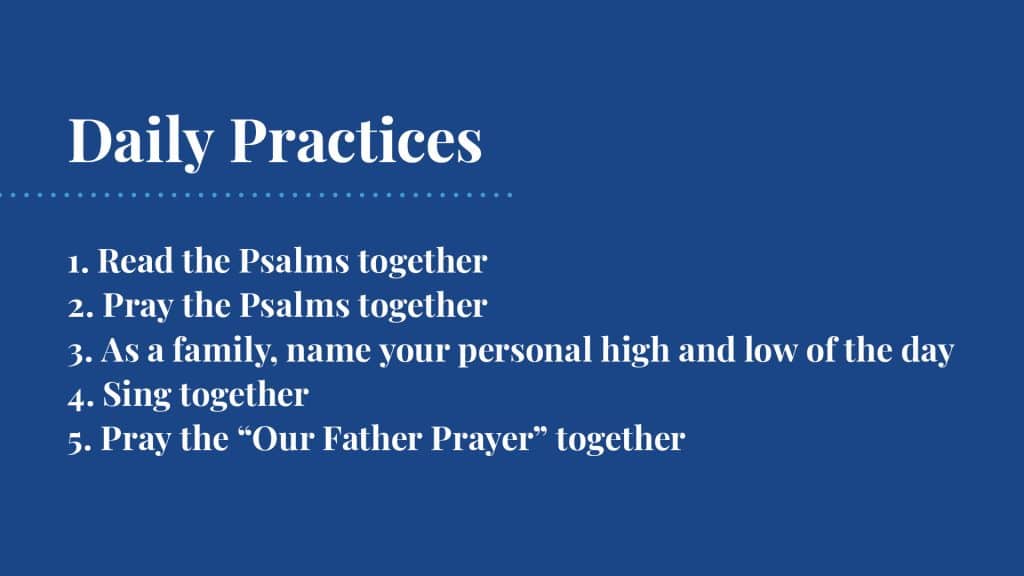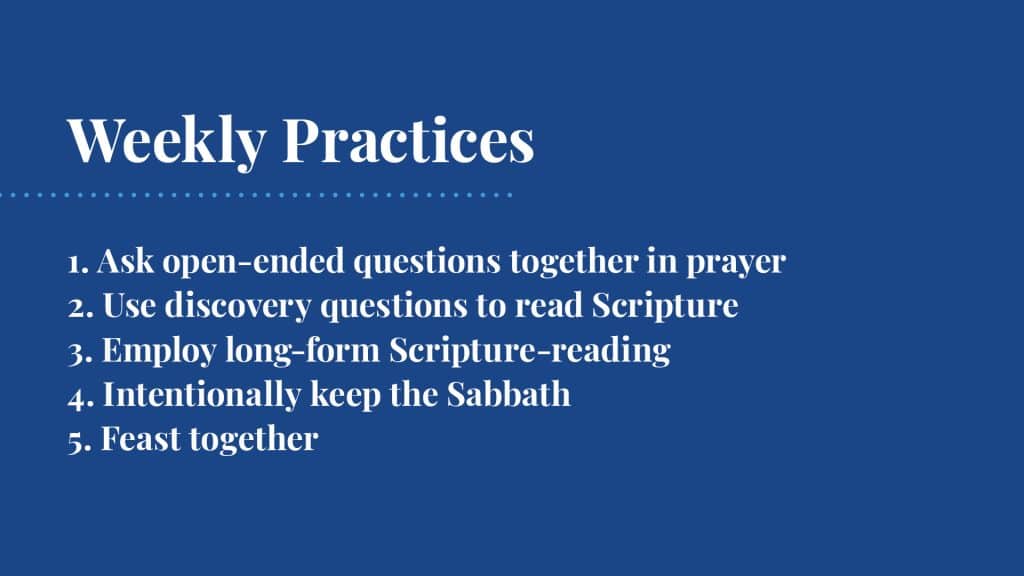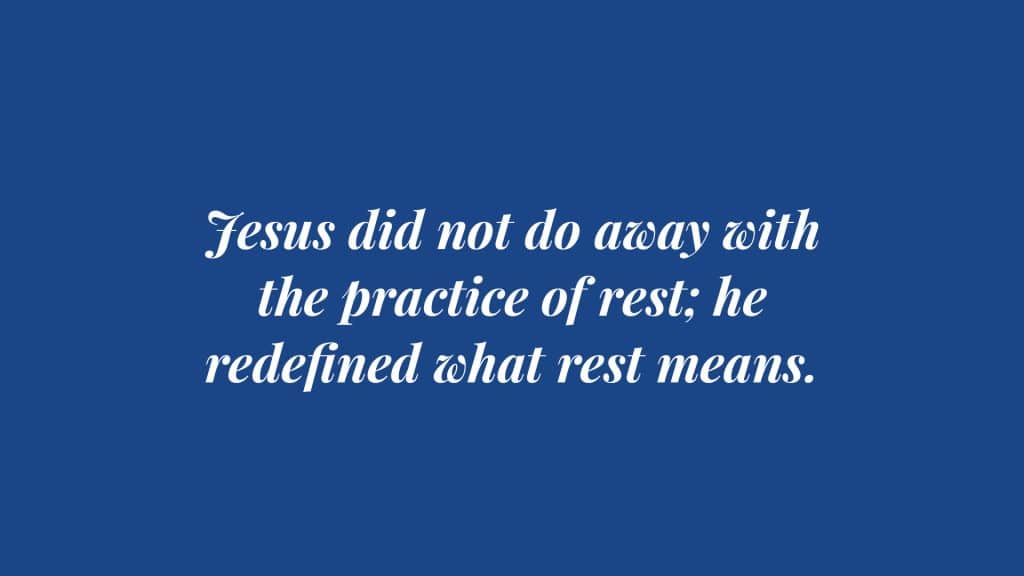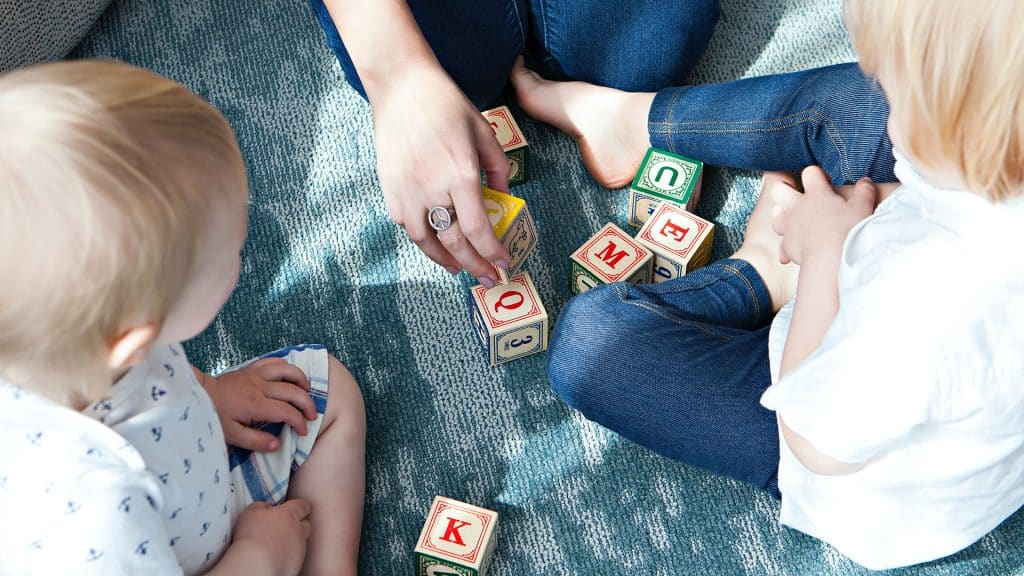The most important spiritual leadership parents provide happens at home. Parents can take at least one of the ten practical steps in this post to get started.
Updated March 2021
Since the COVID-19 virus hit the world, I’ve been thinking more about the great need today for family discipleship. When the virus hit churches in North America (and around the world), we experienced a global crisis.
We also experienced a church crisis.
Leaders were caught off guard by the sudden change. They had to answer many questions, including this: Without Sunday services, how will we disciple families?
Spiritual leadership in the home has been God’s plan from the earliest days, when he first instructed families to “impress” his commands on their children (Deut. 6:4–9).
Leadership at home is still God’s plan today.
Many churches shut their doors and canceled Sunday gatherings—some to never open their doors again. Out of necessity, churches turned to technology in order to live-stream worship services.
All the while, families and singles alike sat at home in isolation.
I wondered whether we had adequately equipped people to worship on their own. Have we equipped family leaders to lead their families spiritually without church services and children’s ministry activities?
Live-streaming and mediums like that have their place, no doubt.
But what about family worship?
Our churches have stepped up with regard to technology, and rightly so, but have we matched our technological excellence with excellence at family leadership training?
During times of crisis, we can more clearly see our weaknesses—so we should take this as a gift to see more clearly our need for greater training in family discipleship, in practical terms.
This post offers a practical jump-start guide to help families take the next steps in their journey with God.
As a young husband and father, I’m learning every day how to lead my family spiritually with the partnership of my wife.
Sometimes, we do well; sometimes, we struggle.
Despite my learning curve and my struggles, I witnessed a strong family discipleship culture from my mom and dad, so I’ve seen this modeled. Whatever good I might replicate with my little family and share with others is what I have received by example from my parents, from friends, and from books, as well.
For all of us, though, we must remember:
The greatest teacher of family discipleship is the Holy Spirit.

God guides and teaches us as we do whatever we can to make disciples in the home.
Plus, I learned a lot from my dad and Jason Houser of Seeds Family Worship when we wrote a book together about this very topic: Dedicated: Training Your Children to Trust and Follow Jesus.
So, I’ve learned from God, from people, and I’ve experimented with my own style of family spiritual practices.
My greatest concern for the church right now is discipleship in the home.
So, I’ve distilled down what I believe are the most important insights and practices you can implement to lead your family through this time. Even more, if you’re a church leader, please pass this content along to your church so we can work together toward equipping our families to better trust and follow Jesus together.
First Barrier to Overcome: Fear
The greatest barrier to spiritual leadership at home is fear:
We fear that we’ll do it wrong.
We fear that we don’t know enough.
We fear what our spouse will think.
We fear our own shortcomings.
We fear not knowing know how to handle Scripture.
Let me say this, though:
The God who expects us to lead our families spiritually also gives us grace as we grow in leadership.
You don’t have to get it all right, but you do have to try.
If we have faith to act, by his grace, our efforts will produce fruit.
But how?
What follows are ten practices I’ve found to be effective—with tools and resources—categorized by a) daily practices and b) weekly practices.
*I recommend you pick just one daily practice and one weekly practice to start. Then, once you get those going, add others.
A. Daily Practices

1. Read the Psalms together
The songbook of the church must include the Psalms. While we can rightly add new songs, the Psalms have always been the Christian’s prayer book. We must learn to utilize these prayers and songs in our homes.
A good place to start is reading the Psalms together as a family—just one Psalm a day.
My wife and I put together a one-page PDF of the Psalms to help us—and others—keep track of where we are in reading these together. Instantly download this by clicking here. Once you download, print it off.
Keep this sheet by your kitchen table, for example, and read a Psalm or a Proverb (or both) every day at breakfast. Or perhaps dinnertime will work better for you.
Whenever you read a chapter, mark it off so you can track your progress.
By the way, the parents and musicians behind EveryPsalm are doing something amazing for families right now. Incredibly, they are writing a song for all 150 biblical Psalms. If you’re a Spotify listener, you can listen to their songs here.
2. Pray the Psalms together
Praying the Psalms is different than reading the Psalms. While we’ve been reading the Psalms as a family for some time now, on a recent retreat, I was convicted to not just read the Psalms, but also to pray them.
This is a more personal experience than merely reading.
Praying the Psalms takes us into the depths from which the Psalms were written.
When we pray the Psalms, we enter into the world of the Psalmists.
We join their cries, praises, pleads, petitions—and even their teachings.
My conviction to start praying the Psalms came from a book I happened upon during the retreat I mentioned: Praying the Psalms by Thomas Merton. I highly recommend this short book.
3. As a family, name your personal high and low of the day
My mom used to do this with me and my sister before we went to bed.
Now, my wife and I practice this with our daughter.
It’s a great way to relationally connect with everyone in the family each day.
And it’s simple! So, make it part of your daily routine—and nighttime seems to work better than morning—to ask, “What was your high and low of the day?” Everyone can share, but no one is obligated to share (especially if you have small kids, or your kids aren’t cooperating). Keep it light and lead by example until your kids learn what it’s about.
4. Sing together
This is where discipleship at home gets fun. While singing together—at least for the not-so-talented singers like me—can be daunting, it’s important!
We sing various songs, but I’ve put together eight songs you can instantly download (with lyrics) and print off at home.
This should help you go ahead and start singing with your family right away (assuming you know some of the songs I listed on that sheet!). If you don’t know any songs to sing, Seeds Family Worship and EveryPsalm can get you started.
It’s totally okay to make a playlist on Spotify—of worship music from artists like Rend Collective or Phil Wickham, to name a few—and just rock those songs with your family.
You don’t have to learn songs ahead of time to start singing them with your family.
Hopefully, we all become families who naturally sing together, as God’s Word expects (Eph. 5:19). It’s a tall order, I know, but there’s life in it. This one is challenging for me, but it’s been so good to grow in this.
Subscribe to HIM Publications to get weekly blogs like this delivered to your inbox.
5. Pray the “Our Father Prayer” together
Commonly called “The Lord’s Prayer,” the “Our Father Prayer” is Jesus’ prayer for disciples. I like to call it “Our Father Prayer” because it starts with “Our Father,” which is beautiful and important. So, it’s fitting to name it accordingly.
Here are my suggestions for families:
- Say this prayer in unison together at the same time every day.
- Use each line as a prompt to pray other, more personal prayers.
- Use a translation that makes sense to you!
This may feel technical, but stick with me because it’s an important point…. I want to offer you my translation of the “Our Father Prayer” because I think it’s helpful and uses modern language.
I taught my family this translation because I’ve simply not found a translation that makes good sense to me in modern English. Phrases like “hallowed be your name” just aren’t natural for me, and that archaic (yet common) translation, actually misses the point for people who don’t know what “hallowed” even means: that our prayer is welcoming God’s holiness, not declaring his holiness or praising him.
I have incorporated into my translation other nuances from this compact prayer that I’ve found to be important.
So, I suggest using The Message paraphrase.
Or a translation like mine:
You can download this print in various sizes—5×7, 8×10, and 11×14—here and frame it. It’s designed for you to place somewhere so you can pray it together as a family.
Feel free to use this or another modern-language translation that makes sense to you. Either way, pray the Our Father Prayer together with your family!
B. Weekly Practices

1. Ask open-ended questions together in prayer
To build off of the last point: When you finish saying the “Our Father Prayer” in unison, ask a family member (you should probably ask them before you start praying though) to pray a specific prayer out of one of the lines of the “Our Father Prayer.”
For example, you could pray (after you recite the whole prayer), “God, let your kingdom come. What does that look like in our lives today?”
Then listen to what the Lord might say to you as a family.
If you’re really bold, you’ll lead your family to say out loud what you sense the Lord might be saying to you.
Your out-loud words aren’t necessarily God’s voice to you, but it’s what you’re thinking about as you try to listen to the Lord in prayer. This is a helpful tool for teaching your kids to hear the voice of God because you’re modeling what you do (assuming this is a practice of your own).
This leads to a bigger task, which is seeking the will of God. Prayer is a key that carries the potential to unlock some hidden pathways into God’s heart—especially for you and your spouse as you try to connect with the Lord together.
Prayer is vulnerable—there’s no doubt about that—but there’s nothing more powerful to me than praying to God with open-ended questions.
Dan Rather, the former CBS anchorman, reportedly asked Mother Theresa about her prayer life (The Other Journal: Prayer, 2013, ix):
“When you pray, what do you say to God?”
She said, “I don’t say anything. I listen.”
“What is it that God says to you when you pray?” Rather asked.
She said, “He doesn’t talk. He simply listens.”
I’ve come to learn the same thing about prayer:
Prayer must include listening.
So, practice this on your own a few times, then try it with your family, too.
This becomes especially important when praying with your spouse about major decisions. You can ask God, “What do you think about this [insert major decision]?”
Then, just pause together in silence and listen.
If you’ve not done this before, you might be surprised at what you hear.
2. Use discovery questions to read Scripture
Do you struggle with knowing how to read Scripture with your family?
Let me share with you the basic framework of what is sometimes called the “Discovery Bible Study” method. The method is really best taught in person, but the basic framework of questions is simple to learn and to try:
Step One: Read a short passage of Scripture twice (e.g., Luke 15:11–32).
Step Two: Ask, “What does this say about?”
… the nature of God?
… the nature of people?
… obedience?
Step Three: Ask two follow-up questions.
1. How do you think God wants you to respond this week? (Think about any actions you could take.)
2. Do you want encouragement to follow through with that?
I suggest using this for shorter passages—like 3–20 verses (yes, that broad range is correct!)—but not more than 25–30 verses most of the time, since that becomes cumbersome to get through all the readings and questions.
3. Employ long-form Scripture-reading
This is an area of weakness for me, but I’ve enjoyed the times I’ve done it.
During the months of the coronavirus pandemic, we all had plenty of time on our hands. But we can make time for this when we practice Sabbath, too (see directly below).
Try reading an entire book of the Bible as a family, in one sitting.
Start with James, or 1 John, or Ephesians.
Then, you can stretch yourself—and this is not something I’ve done yet!—and perhaps read an entire Gospel together. I’ve done this by myself, but not with my family yet.
Doing so might take longer than one sitting, but perhaps in a whole day, with breaks, you could do it. It might only take an hour or two to read Mark, for example.
What a powerful experience.
All of what I’ve written so far are things I have practiced often, but this one, while I’ve done this on my own, is not something I’ve actually done with my family. So, I’ll let you into my secret ambition to try this with my family. Shhh, don’t tell my wife.
Intimidated by thinking about reading that much Scripture in one day? Well, that’s one thing you can do on the Sabbath, which is a corporate discipline that needs to be restored.
4. Intentionally keep the Sabbath
In college, I read a book called The Rest of God: Restoring Your Soul by Restoring the Sabbath by Mark Buchanan, and it changed my life.
Jesus did not do away with the practice of rest; he redefined what rest means.

So, I believe we’re called to incorporate rest even today, and Americans are usually not very good at this.
Read more here: “Sabbath Rest: Why and How Christians Should Embrace a Literal Day of Rest Each Week.”
I’ve heard from others, and when I lived in the Middle East, I observed first-hand how much we Americans often neglect rest for achievement and progress.
Here’s my recommendation to you—and I know this feels conservative and traditional—but it’s been one of the most life-giving practices I’ve experienced on a regular basis for the last ten years of my life:
- Take a literal 24-hour period every week and practice Sabbath.
- During this time, don’t do your normal work activities.
- And here’s the kicker: Don’t just relax, don’t just “veg”. Engage the Lord through prayer, Scripture-reading, and fellowship.
These three core practices—prayer, the Word, and fellowship—are the three core practices I see Jews in the New Testament practicing (Christian and non-Christian alike), specifically in the book of Acts.
Sabbath-keeping is not a new “law”; it’s a liberation from the tyranny of constant work.
Practicing it will liberate your family to truly rest, truly seek God, and truly connect with each other in the Lord.
Nothing’s like it, and if you do it right (by the overtures of God’s graces), the immense peace of God you experience on that day will bleed into the rest of the week.
The Jews would say Shabbat Shalom (or “Sabbath peace”) for a reason!
Whether you’re in quarantine or simply not be able to fellowship as usual on a certain Sunday, make sure to gather your little flock called your family together.
5. Feast together
Another great spiritual practice is eating together as a family.
The Old Testament texts emphasize the beauty of feasting together as the people of God, so while you’re with your family, make sure to enjoy food together.
Paul says, in the context of food in particular, “Everything God created is good, we should not reject any of it but receive it with thanks” (1 Tim. 4:4, NLT).
Plus, when we’re not able to have the Communion Feast with all the saints of our congregations, we must still feast as a family.
Jesus did it, too.
This important spiritual practice of feasting with your family can be a communion not only with each other but also with God. As we feast, we remember not only what Jesus did but also what he will do: One day, when he returns, he will invite those who have trusted and followed him into the marriage supper of the lamb:
“Let us rejoice and be glad
and give him glory!
For the wedding of the Lamb has come,
and his bride has made herself ready.
Fine linen, bright and clean,
was given her to wear.”
(Fine linen stands for the righteous acts of the saints.)
Then the angel said to me, “Write: ‘Blessed are those who are invited to the wedding supper of the Lamb!’”
And he added, “These are the true words of God.”
— Revelation 19:7–10
That is a meal we can all look forward to enjoying together—no matter what happens on this earth.
One final word about leading your family in worship at home: don’t lose heart.
Be encouraged.
Three words of encouragement to close us out:
1. Start learning how to do it.
If you’re scared or intimidated, that’s normal! Press through, and give it a go. Just start, and learn as you go.
Don’t wait until you have it all figured out. Use at least one of the tools I’ve mentioned above to give you a jump start.
2. Ask for grace from your family.
As you begin, ask your family for grace and patience as you learn how to lead.
3. Start now, and don’t give up.
Begin now—and don’t stop.

Subscribe to HIM Publications to get blogs like this delivered to your inbox every week.

Excellent article. One comment. I’m not sure how you conclude that ‘“prayer is mostly about listening.” It seems to me that Scripture fundamentally portrays prayer as talking to God. I’m interested in the thinking behind this statement. Thanks!
Dave, thanks for your comment here. You know, when I was proofreading this, I paused at my own statement here. I’ve thought about it more at the prompt of your comment, so thank you for that, and I think it’s still valid. It could be misconstrued, and perhaps I should revise, but in the context of the anecdote about Dan Rather’s interview of Mother Theresa, “listening” is something we do and something God does. So “mostly about listening” puts the emphasis on the relationship and hearing one another—us hearing God and God hearing us—than about “talking.” Thanks for clarifying here. In the spirit of listening, is there a better way, in your opinion, I could say that? Or does this comment resolve your question?
Thanks for replying, Chad. I read the Dan Rather/Mother Theresa exchange a half-dozen times, and it still made as much sense to me as a dialogue from Alice in Wonderland. She is saying, “I don’t talk to God, and he doesn’t talk to me; we both just listen.” How does that make any sense to an adult, let alone a child? Almost everyone everywhere understands praying as the dictionary defines it: “addressing a solemn request or expression of thanks to a deity or other object of worship.” Again, I’m not aware that the Bible anywhere defines prayer as listening, although listening should be part of our communication and relationship with God. When you say that prayer is mostly about listening, it seems that you are redefining prayer in a way that muddies the water (and perhaps casts it in an unduly mystical light). Why not say something like, “Whenever we pray, we should pray with open ears and hearts, listening for (or giving space to hear what) God’s Spirit might be saying to us”?
Hi Dave, thank you for this. I think the point Mother Theresa was making was not a literal one necessarily but an exaggerated one to make a point. Yes, it definitely involves speaking but so many people *just speak* and don’t listen. That’s the reason for the emphasis on listening here.
The Bible does in narrative and in precept talk about “listening” to God, which I think we agree to be a necessary part of prayer. I never defined it as the definition, but as a very important part of prayer. I too was emphasizing that point.
I hear your caution about sounding unduly mystical, but I don’t find a problem with the Christian mystics like Willard, Foster, and others throughout history (“mysticism” defined as having interactive relationship with God). With so many people not taking time to listen in prayer, I think as long as you don’t take a literalist viewpoint of my words, you’ll hear the point I’m making. I’ll consider how to modify my words here.
Thanks for your comments!
Fantastic breakdown and I appreciate the personal touch here. Will be sharing this with the other dads at our church.
David, great to hear! Encouraged by your comment.
Thanks for this! I have begun premarital counseling with my fiancé and good news so far, no red flags! But she did reveal how important it was to her for me to function as spiritual head of the family, but… I had no models for this growing up and no idea what that looks like. We will no doubt be exploring this further, but your write up here has proved helpful to me.
Great to hear!